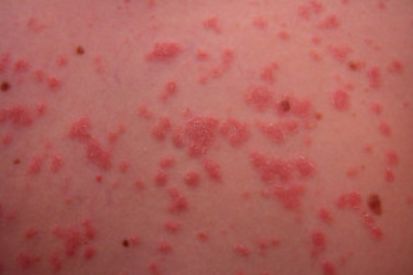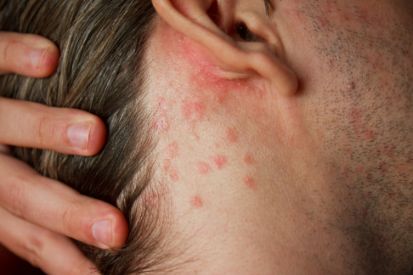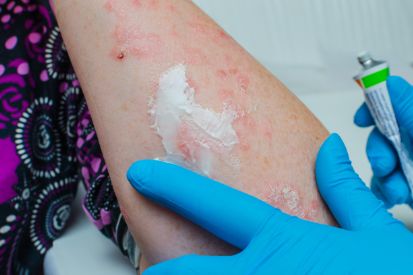Defeat the Flare: Psoriasis and How to Keep Your Skin in Check
Understanding Causes, When to See a Dermatologist, And Treatment Options
 Psoriasis is more than just a skin condition—it’s a chronic autoimmune disease that affects millions of people worldwide. Characterized by red, scaly patches on the skin, psoriasis can be a source of discomfort and self-consciousness for many. If you're dealing with psoriasis, it’s important to understand what causes it, when to seek professional help, and the various treatment options available. This blog will guide you through the essentials of managing psoriasis, with a friendly and informative approach.
Psoriasis is more than just a skin condition—it’s a chronic autoimmune disease that affects millions of people worldwide. Characterized by red, scaly patches on the skin, psoriasis can be a source of discomfort and self-consciousness for many. If you're dealing with psoriasis, it’s important to understand what causes it, when to seek professional help, and the various treatment options available. This blog will guide you through the essentials of managing psoriasis, with a friendly and informative approach.
What Causes Psoriasis?
Psoriasis occurs when the immune system mistakenly attacks healthy skin cells, leading to the rapid production of new cells. Normally, skin cells grow and shed within a month, but in people with psoriasis, this process speeds up to just a few days. The result is a buildup of skin cells that form thick, scaly patches known as plaques.
While the exact cause of psoriasis is not fully understood, it’s believed to be a combination of genetic and environmental factors.
Here are some common triggers of Psoriasis:
1. Genetics
Psoriasis tends to run in families, so if you have a close relative with the condition, you may be more likely to develop it. However, not everyone with a family history of psoriasis will get it.
2. Immune System Issues
Psoriasis is an autoimmune condition, meaning the body’s immune system mistakenly attacks its own cells. In psoriasis, the immune system targets skin cells, causing them to grow too quickly and pile up on the surface.
3. Environmental Triggers
Certain environmental factors can trigger or worsen psoriasis symptoms. Common triggers include stress, skin injuries, infections, and certain medications. Even the weather can play a role, with cold, dry climates often exacerbating symptoms.
4. Lifestyle Factors
Lifestyle choices such as smoking, excessive alcohol consumption, and a poor diet can also influence the severity of psoriasis.
Examples of Psoriasis



When to See A Dermatologist?
If you suspect you have psoriasis, it’s important to consult with a dermatologist for an accurate diagnosis and personalized treatment plan. Here are some signs that it’s time to see a dermatologist:
1. Persistent Red, Scaly Patches
If you notice red, scaly patches on your skin that don’t go away, it’s a good idea to get them checked out. Psoriasis plaques can appear anywhere on the body, but they’re most commonly found on the elbows, knees, scalp, and lower back.
2. Itching and Discomfort
Psoriasis can be itchy and uncomfortable. If your symptoms are causing you distress or interfering with your daily life, a dermatologist can help you find relief.
3. Changes in Your Nails
Psoriasis doesn’t just affect the skin—it can also cause changes in your nails, such as pitting, discoloration, and separation from the nail bed. If you notice any of these changes, it’s worth bringing them to your dermatologist’s attention.
4. Joint Pain
Up to 30% of people with psoriasis also develop psoriatic arthritis, a condition that causes joint pain and swelling. If you experience joint pain along with skin symptoms, it’s crucial to see a dermatologist or rheumatologist for evaluation.
5. No Improvement with Over-the-Counter Treatments
If you’ve tried over-the-counter treatments without success, a dermatologist can prescribe more effective therapies tailored to your specific needs.
Treatment Options for Psoriasis:
While there’s no cure for psoriasis, there are many effective treatments available to manage the symptoms and improve your quality of life. Your dermatologist will work with you to find the best treatment plan based on the severity of your condition, your lifestyle, and your overall health. Here are some common treatment options:
1. Topical Treatments
Topical treatments are often the first line of defense against psoriasis. These include corticosteroids, vitamin D analogs, retinoids, and coal tar. These medications are applied directly to the skin and can help reduce inflammation, slow skin cell growth, and remove scales.
2. Phototherapy
Also known as light therapy, phototherapy involves exposing the skin to controlled amounts of natural or artificial ultraviolet (UV) light. This treatment can slow down skin cell production and reduce inflammation. Phototherapy is usually done in a dermatologist’s office, but home units are also available for certain patients.
3. Systemic Medications
For more severe cases of psoriasis, systemic medications may be necessary. These include oral or injectable drugs that work throughout the body to target the immune system. Common systemic medications include methotrexate, cyclosporine, and biologics, which are a newer class of drugs that specifically target the immune system components involved in psoriasis.
4. Lifestyle Modifications
In addition to medical treatments, making certain lifestyle changes can help manage psoriasis symptoms. Maintaining a healthy diet, avoiding triggers like stress and smoking, and keeping your skin moisturized can all contribute to better skin health.
5. Combination Therapy
Sometimes, a combination of treatments works best. Your dermatologist may recommend using topical treatments along with phototherapy or systemic medications to achieve the best results.
Take Control of Your Psoriasis
Living with psoriasis can be challenging, but with the right care and treatment, you can manage your symptoms and maintain a good quality of life. If you’re experiencing any signs of psoriasis, don’t hesitate to reach out to a dermatologist. Early intervention can make a big difference in keeping your skin healthy and comfortable.
At Dermatology Affiliates, we’re here to support you every step of the way. Whether you’re newly diagnosed or have been managing psoriasis for years, our team of experts is dedicated to helping you find the most effective treatment plan for your needs. Reach out to us today and take the first step towards clearer, healthier skin.
Featured Products for Sensitive Skin
Check your local office for current stock!
Check your local office for current stock!
Featured Blogs

- Skin Care
- Cosmetic Treatments
Having eczema or sensitivities to fragrance can take most of the fun out of buying soaps, lotions and other skincare products.
Read More
- General Dermatology
- Skin Care
- Chronic Skin Conditions
Skin tags are benign growths of excess skin which form in response to rubbing and irritation. Read more to learn about what we can do about them.
Read More
- General Dermatology
- Skin Exams
- Chronic Skin Conditions
Discover the top 5 psoriasis triggers and learn how to avoid them. Reduce flare-ups and improve your skin health with these practical tips.
Read More


